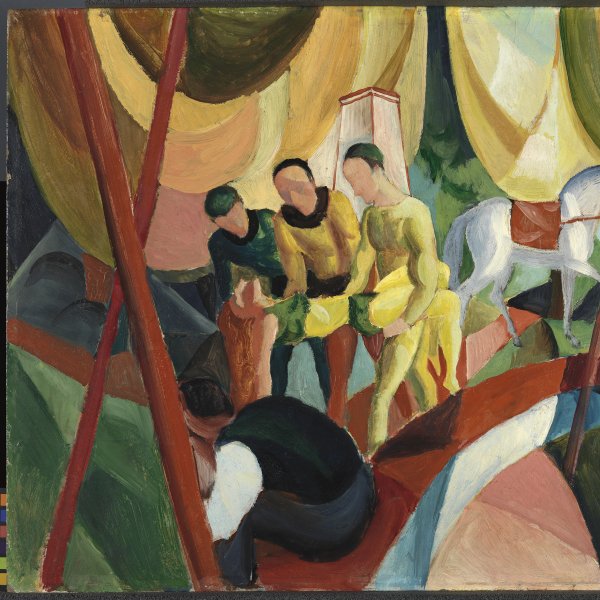Hussars on a Sortie
1913
Oil on canvas.
37.5 x 56.1 cm
Museo Nacional Thyssen-Bornemisza, Madrid
Inv. no.
655
(1980.50
)
ROOM 36
Level 1
Permanent Collection
Hussars on a Sortie displays the powerful influence of Futurist simultaneity on August Macke’s painting. The German translation of the 1910 Technical Manifesto of Futurist Paintingwas published by Herwarth Walden in the magazine Der Sturm in March 1912 while his Berlin gallery was showing an exhibition of the Italians’ works.
According to Vriesen, the work was painted in the artist’s Bonn studio in 1913 and the subject matter, so uncommon in his oeuvre, may stem from his enlistment as a voluntary in the 160th Infantry Regiment in 1908. The sketch-like nature of the composition is no doubt due to the fact that Macke was essentially concerned with capturing movement. The image of horsemen in action was a motif that was especially appreciated by the Futurists, who referred to the galloping of horses as follows in their manifesto: “On account of the persistency of an image upon the retina, moving objects constantly multiply themselves; their form changes like rapid vibrations, in their mad career. Thus a running horse has not four legs, but twenty, and their movements are triangular.”
Paloma Alarcó
According to Vriesen, the work was painted in the artist’s Bonn studio in 1913 and the subject matter, so uncommon in his oeuvre, may stem from his enlistment as a voluntary in the 160th Infantry Regiment in 1908. The sketch-like nature of the composition is no doubt due to the fact that Macke was essentially concerned with capturing movement. The image of horsemen in action was a motif that was especially appreciated by the Futurists, who referred to the galloping of horses as follows in their manifesto: “On account of the persistency of an image upon the retina, moving objects constantly multiply themselves; their form changes like rapid vibrations, in their mad career. Thus a running horse has not four legs, but twenty, and their movements are triangular.”
Paloma Alarcó









